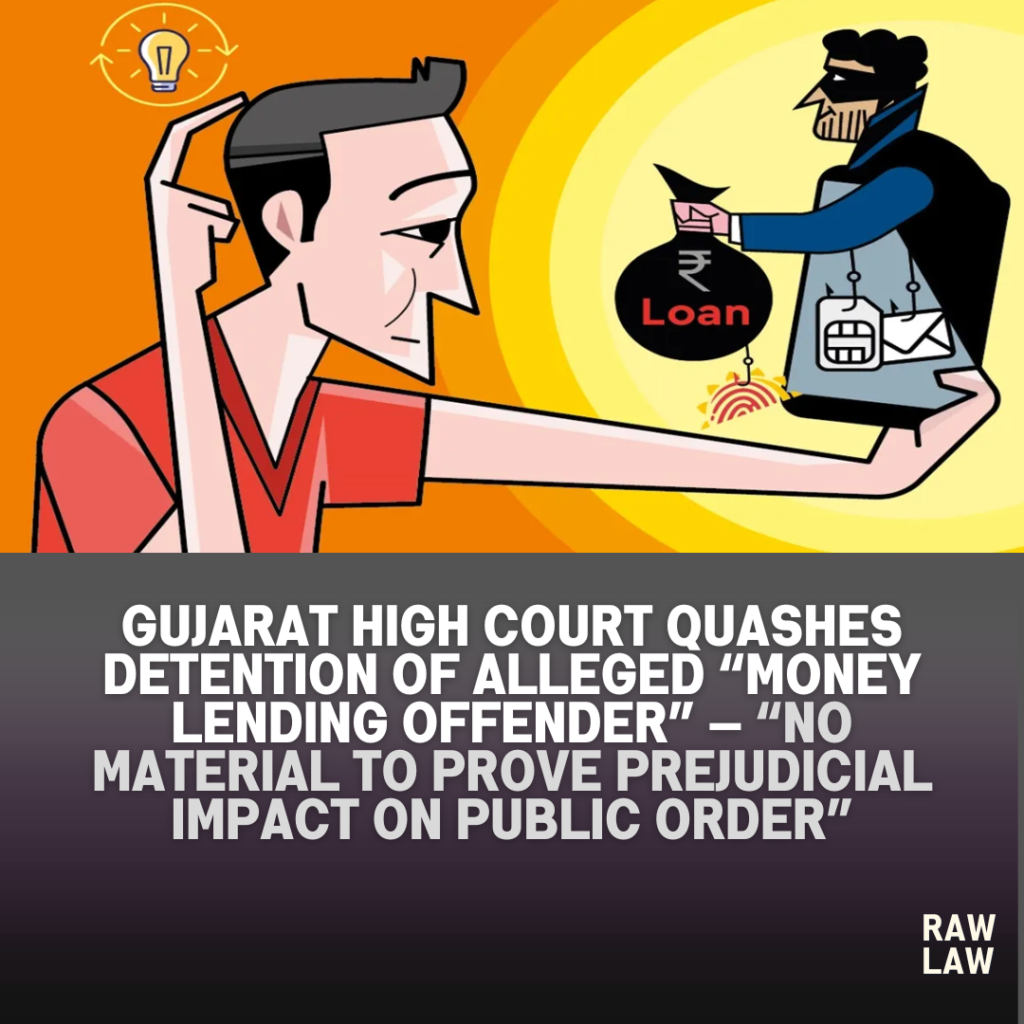Court’s Decision
In a significant ruling dated 12 June 2025, the Gujarat High Court quashed the preventive detention order passed under the Gujarat Prevention of Anti-social Activities Act, 1985, against an individual labelled as a “money lending offender.” The Division Bench of Justices Ilesh J. Vora and P. M. Raval held that there was no material on record to justify the claim that the alleged actions had a prejudicial impact on public order. The Court ruled that the order lacked legal basis, stating:
“The subjective satisfaction arrived at by the detaining authority cannot be said to be legal, valid and in accordance with law.”
Facts
The detenue was preventively detained under an order dated 30.04.2025 by the District Magistrate, Surat, branding him as a “money lending offender” under Section 2(ga) of the 1985 Act. This was based on a case registered with Mahidharpura Police Station involving offences under Sections 108, 308(2), 351(3), and 352 of the Bharatiya Nyaya Sanhita, 2023, along with Sections 40(a)(b)(c) and 42(a)(d) of the Gujarat Money Lenders Act, 2011. The petitioner challenged the detention as lacking nexus with public order.
Issues
- Whether the detention order could be sustained in the absence of adequate material linking the petitioner’s activities to a threat to public order.
- Whether registration of offences under the Gujarat Money Lenders Act alone was sufficient for invoking preventive detention.
- Whether the detaining authority rightly interpreted Section 2(ga) of the PASA Act.
Petitioner’s Arguments
The petitioner argued that the registration of a criminal case did not demonstrate any adverse impact on public order. He asserted that the allegations pertained solely to law and order violations, and hence did not meet the threshold under Section 3(4) of the Act. It was further contended that no conviction under the Money Lenders Act was established, and the offences were purely private in nature, lacking the community-wide disruption required to justify preventive detention.
Respondent’s Arguments
The State contended that the petitioner was a habitual offender whose actions affected the society at large. It was argued that the detaining authority had rightly exercised its powers based on the antecedents and past conduct of the petitioner to prevent recurrence of offences prejudicial to public order.
Analysis of the Law
The Court analysed Section 2(ga) of the 1985 Act, which defines a “money lending offender,” and contrasted it with the material on record. The provision requires either conviction or conduct involving threats or use of physical violence in money recovery. The Court found no material indicating any conviction or violent tactics used for money recovery. Additionally, the offences alleged were not shown to have affected the “even tempo of the life of the community,” a necessary element for invoking preventive detention.
Precedent Analysis
The Court relied extensively on:
- Piyush Kantilal Mehta v. Commissioner of Police, 1989 Supp (1) SCC 322: Held that registration of offences, even for bootlegging, is not sufficient unless public order is disturbed.
- Pushkar Mukherjee v. State of West Bengal, (1969) 1 SCC 10: Distinguished between “law and order” and “public order,” stressing that only disturbances affecting the community at large justify preventive detention.
These precedents clarified that preventive detention requires proof of activities affecting the public at large, not just private disputes or offences.
Court’s Reasoning
The Court concluded that:
- No conviction or evidence was produced that the petitioner used violence or threatened borrowers.
- The alleged offences did not create panic, insecurity, or affect the life of the community.
- The detaining authority failed to demonstrate how the petitioner’s actions prejudicially affected public order.
Thus, the subjective satisfaction of the authority was unfounded.
Conclusion
The Gujarat High Court allowed the petition and quashed the detention order dated 30.04.2025. It directed immediate release of the petitioner unless required in any other case and held:
“The alleged activities of the detenue do not have any bearing on the maintenance of public order.”
Implications
This ruling reinforces the principle that preventive detention under PASA must satisfy strict statutory and constitutional thresholds. Mere registration of offences, particularly those impacting private parties, cannot substitute a concrete threat to public order. The judgment will act as a deterrent against arbitrary detention under the guise of habitual offender classifications.
Cases Referred and Their Relevance
- Piyush Kantilal Mehta v. Commissioner of Police, 1989 Supp (1) SCC 322 — Clarified that mere involvement in bootlegging does not suffice unless public order is disturbed.
- Pushkar Mukherjee v. State of West Bengal, (1969) 1 SCC 10 — Established the legal distinction between “law and order” and “public order,” foundational to evaluating preventive detention.
